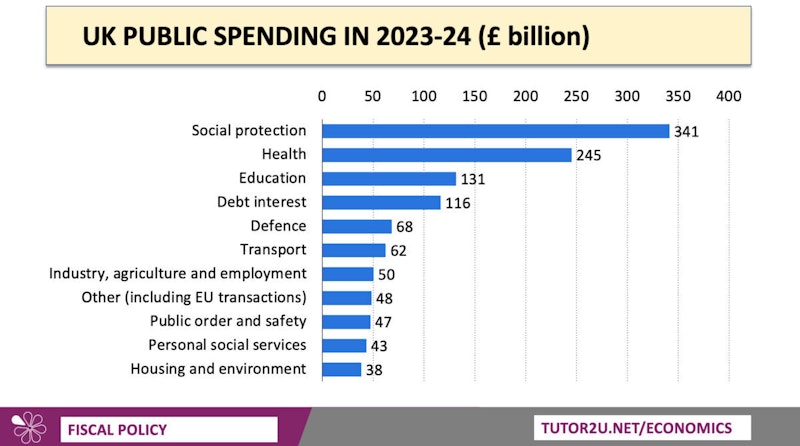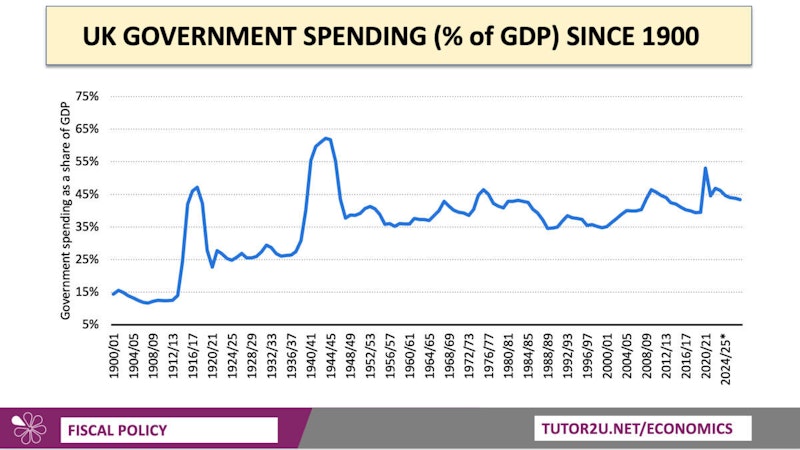Study Notes
Fiscal Policy - examine the significance of changes in government spending in an economy such as the UK
- Level:
- AS, A-Level, IB
Last updated 28 Oct 2023
This study note covers this question: Examine the significance of changes in government spending in an economy such as the UK

Changes in government spending can have a significant impact on an economy, including the UK, for a variety of reasons. The significance of these changes lies in their ability to influence economic growth, employment, inflation, and overall economic stability.
Here are some key aspects to consider when examining the significance of changes in government spending in the UK:
- Economic Growth: Government spending, particularly on infrastructure projects, education, and healthcare, can stimulate economic growth. When the government increases its spending, it can boost aggregate demand for goods and services, leading to increased production and employment. This is especially important during times of economic downturns when the private sector may be reluctant to invest.
- Employment: Government spending has the potential to create jobs directly through public sector employment and indirectly by supporting private sector businesses. For instance, increased spending on public projects like building and maintaining infrastructure can lead to job creation in construction and related industries.
- Income Distribution: Government spending can also play a role in addressing income inequality. Social welfare programmes, healthcare, and education spending can redistribute income and provide a social safety net for vulnerable populations.
- Inflation: Significant increases in government spending, if not matched by revenue increases or other fiscal measures, can potentially lead to inflationary pressures. This is a concern when government spending outpaces the economy's productive capacity, leading to increased demand without a corresponding increase in supply.
- Public Investment: Government spending on long-term public investments, such as education, research, and infrastructure, can enhance the economy's productive capacity and competitiveness. This is crucial for sustaining economic growth in the long run by driving improvements in long run aggregate supply and competitiveness.
- Monetary Policy Coordination: Changes in government spending may require coordination with monetary policy. The central bank may need to adjust interest rates to counteract the effects of fiscal policy changes to maintain price stability.
- Business Confidence (Animal Spirits): Government spending can influence business confidence. When businesses see increased government investment in the economy, they may become more willing to invest themselves, leading to greater economic activity.
- Deficit and Debt: Increases in government spending can lead to budget deficits if not matched by revenue increases. Over time, persistent deficits can lead to a growing national debt, which may have implications for future economic stability and fiscal sustainability.
In the UK, as in many other developed economies, government spending is a crucial policy tool used to achieve economic and social objectives. The significance of changes in government spending lies in their potential to shape the trajectory of the economy, influence the standard of living, and address social issues. However, finding the right balance in government spending is essential, as excessive spending can lead to fiscal imbalances and inflation, while insufficient spending can hinder economic growth and social well-being.

You might also like
Macroeconomic Objectives and Macro Stability
Study Notes
Does UK government spending help the poorest – or the middle class?
3rd February 2016

Theresa May's 'Modern Industrial Strategy'
23rd January 2017
Fiscal Policy and Inequality (Revision Essay Plan)
Practice Exam Questions
Factors that can cause an economic recession
Topic Videos
Macroeconomic Policy Revision (Online Lesson)
Online Lessons
Super Villains: Macroeconomic Policies Teaching Activity
Teaching Activities
